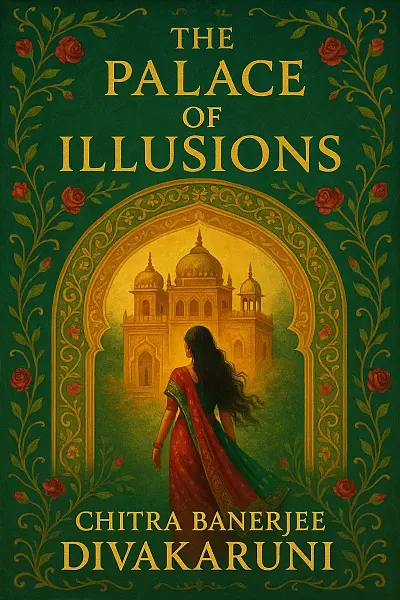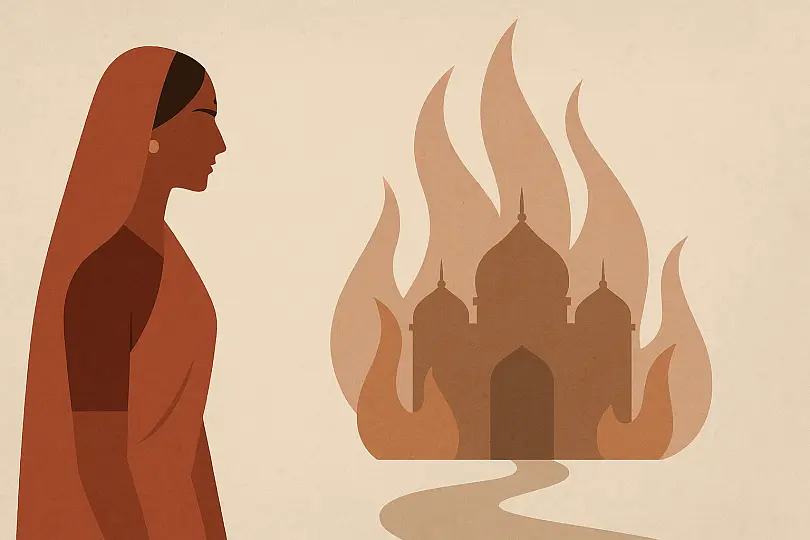
The Palace of Illusions
Panchaali, a fiery princess born of fire, lives in the dazzling, magical world of ancient India, longing for purpose beyond her royal fate. Everything changes when she marries the five Pandava brothers and is thrust into the center of a kingdom ripped away by betrayal.
As Panchaali fights to reclaim her family's birthright, she navigates dangerous rivalries, tangled loyalties, and her own forbidden desires. Facing years of exile, simmering war, and her demanding role as queen, she's forced to weigh her heart against her duty.
Told with lush, lyrical prose, this story pulses with intimate insight and timeless, mythic tension.
"“In the shadows of destiny, a woman’s voice can shape the world as surely as a hero’s sword.”"
Let's Break This Down
The Author's Voice
Atmosphere
Lush, dreamlike, and steeped in myth, the atmosphere shimmers with the golden haze of memory and ancient magic. Expect scented corridors, vibrant courts, and moody palaces, all swirling with secrets and intrigue. The world feels at once opulent and haunted, its grandeur laced with undercurrents of longing and sorrow. Each scene is drenched in the heat, colors, and emotional intensity of epic legend.
Prose Style
Divakaruni writes in rich, evocative language—her sentences glide with a storyteller's grace, layering imagery, emotion, and sharp observation. Her style blends lyrical flourishes with direct, confident narration, giving readers the sense that each word is spun with purpose. Dialogue often feels intimate, natural, but tinged with the mythic, and introspection is painted with poetic metaphors. The narration is highly personal and reflective, yet never heavy-handed.
Pacing
The pacing is smooth but deliberate, almost languorous in places—perfect for savoring the language and emotional beats. The narrative lingers on character insights and dramatic moments, allowing the tale's epic events to unfold with a sense of inevitability. Action and reflection are carefully balanced, but if you're after breakneck speed or nonstop twists, this story prefers to unfurl and smolder rather than rush.
Mood
Expect a mood that is both empowering and melancholic—the tone oscillates between fierce independence and aching vulnerability. There's a strong undercurrent of yearning and loss running beneath moments of joy and triumph. Divakaruni crafts an atmosphere of enchantment where hope and heartbreak often walk hand-in-hand.
Voice
The narrative voice is bold, wry, and deeply personal. Panchaali's perspective crackles with intelligence, wit, and a persistent sense of questioning. She addresses the reader with candor and sometimes sly humor, making her epic struggles feel intimate and immediate. The voice is unapologetically modern in its emotional honesty, even as it navigates ancient traditions.
Imagery and Symbolism
Vivid, sensory details fill every page—fragrant flowers, shifting silks, shimmering halls, and shadowed gardens. Symbolism is deftly woven into the narrative: fire, fate, and illusion recur throughout, enriching the story with deeper layers and resonant motifs. Divakaruni's use of imagery heightens the magical realism of the world while grounding it in lived experience.
Overall Feel
The writing is enchanting and immersive, wrapping you in a tapestry of stories that feel both timeless and urgent. If you love fiction that merges mythology with the personal, and prose that reads like a spell, you'll feel right at home in The Palace of Illusions.
Key Moments
-
Panchaali’s fiery voice turns ancient legend inside out—she’s no mythic damsel, but your new favorite rebel
-
Spellbinding descriptions of the magical palace—where every shimmering hallway echoes with secrets and longing
-
Friendship and betrayal entwine as Draupadi navigates the love triangle with Arjun and Karna—YES, the tension sizzles off the page
-
Witty court intrigue—from dice game disaster to exile, each twist pulls you deeper into the emotional labyrinth
-
Gorgeous prose that blends epic spectacle with moments of raw vulnerability—Chitra Banerjee Divakaruni does not miss!
-
Unforgettable exploration of fate vs. agency—Draupadi’s choices push against destiny, reimagining the Mahabharat’s familiar lines
-
A female gaze that finally demands: Who gets to tell these ancient stories—and why?
Plot Summary
The Palace of Illusions follows the life of Panchaali (also known as Draupadi), the enigmatic queen from the Indian epic, the Mahabharata. The retelling begins with Panchaali’s dramatic birth from fire, destined for a unique fate, and charts her childhood yearning for respect and agency in a world dominated by men. As she weds the five Pandava brothers and becomes queen of their magical palace—only to lose everything in a game of dice—the novel explores her inner struggles, ambitions, and heartbreak. The plot unravels with the lead-up to the monumental war at Kurukshetra, highlighting Panchaali’s complicated relationships, her powerful rivalry with Kunti, and intense longing for Karna. Ultimately, as the epic tragedy unfolds and her loved ones perish, Panchaali faces death with hard-won wisdom and regret, questioning destiny and her role in the devastation.
Character Analysis
Panchaali stands at the heart of the story—ambitious, passionate, and deeply flawed, she constantly seeks acknowledgment and battles constraints placed on her gender. Through her voice, we see a woman navigating betrayal, loss, and fierce love, especially in her relationships with her five husbands and the forbidden Karna. The Pandavas are characterized as valiant yet human; each brother possesses individual traits, with Arjun’s devotion and Yudhishthir’s moral dilemmas taking center stage. Karna’s arc is complex and tragic, shaped by loyalty and social ostracization, while supporting figures like Kunti, Dhri, and Krishna add layers to Panchaali’s evolving worldview. Most characters change through suffering, evolving from pride or vengeance toward humility or acceptance by the novel’s bittersweet end.
Major Themes
The book delves into female agency and voice, giving new depth to a character often sidelined in the original epic, and asks what it means to define one’s destiny in a patriarchal society. Power and illusion are central—the titular palace becomes a metaphor for appearances versus hidden truths, while relationships and loyalty are repeatedly tested by pride and ambition (e.g., the dice game’s consequences). Fate versus free will surfaces as characters both resist and succumb to their destinies, especially seen in Panchaali’s struggle to shape her own life. The cost of war and vengeance resonates throughout, showing how a quest for justice can result in unforeseen suffering and regret.
Literary Techniques & Style
Chitra Banerjee Divakaruni’s prose is lyrical, emotive, and candid, blending modern sensibility with mythic storytelling. The narrative unfolds in the first person, offering readers intimate access to Panchaali’s inner world; her tone is reflective, often defiant, and full of longing. The novel employs rich symbolism—the palace itself, fire, the dice, and dreams—layering meanings and foreshadowing key events. Metaphors and vivid imagery make both characters and settings leap off the page, and the magic-realism elements mesh seamlessly with historic details, reinforcing the story’s otherworldly yet deeply human atmosphere.
Historical/Cultural Context
Set in the ancient, mythological landscape of India, the novel draws from Mahabharata but filters the epic’s grand events through a modern feminist lens. Social issues—rigid caste systems, gender roles, political intrigue—shape every chapter, mirroring both ancient and timeless real-world concerns. The setting is lushly detailed; palaces, courts, and battlefields provide a dynamic backdrop to Panchaali’s personal journey as she navigates the cultural and religious values of her era.
Critical Significance & Impact
The Palace of Illusions has been widely celebrated for reclaiming and re-energizing a classic myth from a woman’s perspective, making the Mahabharata accessible and resonant for new generations. Readers and critics alike laud its psychological complexity and fresh voice, though some wish for more nuanced development of side characters. Its blend of traditions with contemporary themes ensures its appeal and relevance, especially in discussions around gender and cultural storytelling, keeping the conversation alive about who gets to tell history—and how.

A heroine’s journey through myth and magic—Mahabharat as you’ve never heard it.
What Readers Are Saying
Right for You If
Who’s going to fall head over heels for The Palace of Illusions?
-
If you love retellings of classic myths and legends, especially ones with a bold, fresh perspective, this book is totally your jam. Honestly, fans of Madeline Miller’s Circe or Anita Nair’s Ladies Coupé will just eat this up.
-
Does lush, lyrical writing make you swoon? You’ll find yourself rereading passages just for pure enjoyment. Divakaruni paints scenes and emotions so vividly, it’s basically literary eye candy.
-
Strong female leads? Check. If you’re craving stories told through the eyes of complex, clever women who haven’t always gotten their spotlight (looking at you, lovers of feminist fiction), say hello to Panchaali—a voice you won’t forget.
-
If you geek out over Indian epics or enjoy historical fantasy with a twist, this is a treasure trove. It unpacks the Mahabharata in a relatable, accessible way, so even if you’re not super familiar with the original, you won’t feel lost.
But hey, heads up!
-
If you’re mostly here for fast-paced action scenes or intense battle sequences, you might find yourself wishing things would move quicker. The book spends a lot of time exploring feelings, relationships, and backstory—so it might drag for those who prefer plot over introspection.
-
Hardcore purists of mythology who want every detail to match the original epic, this version might get on your nerves. It takes creative liberties and really dives into Panchaali’s inner world, sometimes at the expense of sticking to the classic script.
-
Folks who’d rather skip introspective, character-driven narratives in favor of straightforward adventures or thrillers—this probably isn’t your vibe. It’s more about personal journeys and emotional growth than plot twists or high-stakes drama.
Bottom line: If you’re after a rich, imaginative retelling with a fierce female perspective and lots of heart, The Palace of Illusions totally delivers. If you crave speed, action, or unwavering faithfulness to the original myth, you might want to look elsewhere. Totally depends on what you’re in the mood for!
What You're Getting Into
**Step into a world of ancient legend as Chitra Banerjee Divakaruni’s The Palace of Illusions *reimagines the epic Mahabharata through the fiercely intelligent and passionate eyes of Panchaali, a heroine determined to carve out her own destiny.
Caught in the swirling currents of royal intrigues, forbidden loves, and devastating wars, Panchaali grapples with her longing for agency in a society shaped by gods, men, and fate. With lyrical prose and lush world-building, this novel offers a deeply human, utterly captivating perspective on myth, power, and the secrets we keep—even from ourselves.
Characters You'll Meet
-
Panchaali (Draupadi): The outspoken, complex heroine whose perspective transforms the epic Mahabharat. Her longing for agency and her tangled relationships are the novel’s emotional core.
-
Krishna: Panchaali’s enigmatic confidant and spiritual guide. His wisdom and mystery anchor the story and shape Panchaali’s choices.
-
Yudhishthir: The principled eldest Pandava and Panchaali’s husband. His sense of duty often clashes with personal desires, making him both admirable and deeply flawed.
-
Bhima: Fiercely loyal and passionate, he’s the most physically imposing Pandava and harbors unspoken devotion for Panchaali, adding poignant layers to their dynamic.
-
Karna: Tragic, noble, and eternally conflicted, he’s both Panchaali’s secret yearning and the Pandavas’ greatest rival. His past and choices heavily influence the story’s trajectory.
More Like This
If you found yourself captivated by Madeline Miller’s "Circe," you'll be absolutely drawn into The Palace of Illusions. Both novels skillfully reimagine ancient myths through the powerful, intimate lens of a misunderstood woman standing at the heart of an epic, offering fresh empathy for legendary figures typically overshadowed in the original tales. Divakaruni’s retelling of the Mahabharata through Panchaali is every bit as spellbinding and introspective as Miller’s take on Greek myth—each page hums with emotion and subversive wit.
Fans of Margaret Atwood's "The Penelopiad" will find compelling parallels here, especially in the way both authors give voice to long-silenced female perspectives within iconic stories. While Atwood's Penelope waits and observes from the margins, Panchaali wrestles directly with destiny, her ambitions and vulnerabilities infusing the very fabric of the ancient epic.
On screen, The Palace of Illusions shares a spiritual kinship with the storytelling verve of "Game of Thrones": both plunge readers into worlds of shifting alliances, palace intrigue, and complicated, fierce women making impossible choices. If the tangled loyalties and moral ambiguities of Westeros gripped you, Panchaali’s journey through love, war, and betrayal will be incredibly satisfying, colored by the lush tapestry of Indian mythology.
Critic's Corner
What if the voice history forgot held the key to understanding its grandest tales?
Chitra Banerjee Divakaruni’s The Palace of Illusions spins pure gold from this question, catapulting us straight into the chaotic beauty of the Mahabharat—this time seen through the fierce, wounded, and wonderfully human eyes of Panchaali. In a world that too often sidelines women, Divakaruni’s retelling feels both audaciously fresh and poignantly overdue. It’s a challenge to our tendency to accept old stories at face value, an invitation to step into the margins and find new meaning there. Could the most radical act of storytelling today be not invention, but reclamation?
Divakaruni’s prose is lush yet disciplined, barefoot and candlelit one moment, sharp and clear-eyed the next. She strikes a rare balance between lyricism and clarity—images linger, but never bog down the momentum. The narrative voice is distinctively Panchaali’s: frank, acerbic, sometimes self-lacerating, always deeply personal. The text brims with sensory detail—the gold of a sari, the taste of shame—wrapping readers in an evocative, tactile world. Dialogues snap with subtext, especially in charged scenes with characters like Krishna and Kunti, and the prose masterfully navigates between memory and immediacy. Instead of resting comfortably in mythic grandeur, Divakaruni roots the epic in everyday emotions, revealing both rage and tenderness in the same breath. At times, this highly internal approach makes the grand sweep of war and destiny feel intimate, almost claustrophobic—a double-edged sword that simultaneously humanizes and risks diminishing the mythic scale.
Central themes swirl from page one: the burden of destiny, the agony and agency of women within patriarchal worlds, the slipperiness of truth. The Palace of Illusions doesn’t just subvert from the sidelines; it rebuilds the center. Questions of loyalty, longing, and self-worth trip Panchaali with as much force as any external enemy. For modern readers, her struggle to claim voice and space in an era of male histories resonates gut-deep, mirroring contemporary battles against erasure. Divakaruni probes the fraught nature of power—not simply who wields it, but the invisible costs borne by those condemned to watch, to wait, to carry the wounds. The book also scrutinizes war—not merely as spectacle, but as a collision of relationships and private sufferings, starkly relevant in a world still riven by conflict. The philosophical edge bites: Can one ever escape fate, or simply inhabit it more courageously?
Within the genre of mythic retellings and feminist revisionism, The Palace of Illusions stands razor-sharp. It echoes works like Madeline Miller’s Circe or Marion Zimmer Bradley’s The Mists of Avalon, yet its distinctly Indian voice and attentiveness to generational trauma grant it particular depth. Fans of Divakaruni’s other novels will find familiar strengths—rich atmosphere, nuanced characters—but here, she embarks on a more daring, ambitious act of cultural translation. The novel both honors and subverts the oral tradition, spotlighting the silences that shaped whole civilizations.
Not every risk pays off—occasionally, introspection blurs into melodrama, and minor characters remain sketches beside Panchaali’s vivid presence. Yet Divakaruni’s charismatic storytelling and audacious empathy transform a centuries-old epic into a searing contemporary meditation. The Palace of Illusions matters now because its illusions still cast shadows: over history, over gender, over whose voices we allow into our halls. This is a novel that lingers and needles, asking us to see—really see—the women behind the myths.
Community Thoughts
Honestly, Panchaali's bitterness clung to me for days, especially after that dice game scene. The room felt colder, like betrayal itself was in the air. Couldn't shake it off, even re-read that chapter twice just to process.
the way Panchaali haunted me after finishing this book is wild. she’s fierce and broken and so damn real. couldn’t shake her off for days, like she was whispering secrets in the dark.
Honestly, I was just reading along when BAM, Panchaali’s voice twisted everything I thought I knew about Draupadi. That dice scene? My heart was in my throat. Couldn’t sleep after, kept replaying her rage and heartbreak.
Honestly, after reading Panchaali’s firewalk, I just sat there staring at the wall, heart thumping. That twist? Wild. I’m still questioning who I’m rooting for. This book scrambled my brain in the best way possible.
okay but panchaali’s stubbornness just LINGERED, like an echo in my mind, making me question every choice I’ve ever made. couldn’t sleep, kept replaying her defiance. is this what empowerment feels like at 2am?
Leave Your Review
Local Take
Why It Matters
The Palace of Illusions by Chitra Banerjee Divakaruni really strikes a chord with Indian readers because it reimagines the Mahabharata—a text deeply woven into everyday life here—from Draupadi’s rebellious perspective.
-
Parallels to India’s own history pop up everywhere: Draupadi’s fight for agency echoes powerful female figures from India’s independence movement or the ongoing debates about women’s autonomy.
-
The book’s themes—like destiny versus free will, honor, and familial loyalty—fit snugly in Indian cultural values, but the novel challenges norms by giving voice to a woman who questions tradition and male authority.
-
Some plot points hit harder: Draupadi’s humiliation in the court feels tragically relatable with modern conversations on women’s dignity and justice.
-
Divakaruni’s modern, lyrical prose mirrors the epic storytelling tradition, but she flips it—creating a feminist retelling that’s both familiar and delightfully subversive to readers raised on the classic Mahabharata tales.
Food for Thought
No major controversies are associated with The Palace of Illusions.
- Notable achievement:
The novel is widely celebrated for its unique feminist retelling of the Mahabharat from Draupadi’s perspective and has become a staple in modern Indian literature, frequently featured on bestseller lists and syllabus recommendations for courses in world and South Asian literature.
Like what you see? Share it with other readers







